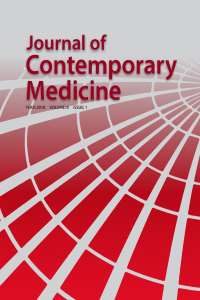Kök hücre nakli ve sensorinöral işitme kaybında kullanımı ile ilgili KBB doktorlarına uygulanan bilgi sorgulama anket sonuçları
KBB doktorları, sensorinöral işitme kaybı, kök hücre
Results of the survey carried out with ENT doctors regarding stem cell transplantation and its use in sensorineural hearing loss
ENT doctors, sensorineural hearing loss, stem cell,
___
- Yamanaka S. Induced pluripotent stem cells: past, present, and future. Cell stem cell. 2012;10(6):678-84.
- KARAŞAHİN T. Embriyonik kök hücreler. Erciyes Üniversitesi Veteriner Fakültesi Dergisi. 2012;9(1).
- Kepekci AH, ÖZTURAN OÖ, KÖKER MY. Pluripotent stem cells and their use in hearing loss. Turkish Journal of Biology. 2016;40(5):1033-9.Hu Z, Ulfendahl M. The potential of stem cells for the restoration of auditory function in humans. Regenerative medicine. 2013;8(3):309-18.
- Koehler KR, Mikosz AM, Molosh AI, Patel D, Hashino E. Generation of inner ear sensory epithelia from pluripotent stem cells in 3D culture. Nature. 2013;500(7461):217-21.
- Oshima K, Shin K, Diensthuber M, Peng AW, Ricci AJ, Heller S. Mechanosensitive hair cell-like cells from embryonic and induced pluripotent stem cells. Cell. 2010;141(4):704-16.
- Merling RK, Sweeney CL, Chu J, Bodansky A, Choi U, Priel DL, et al. An AAVS1-targeted minigene platform for correction of iPSCs from all five types of chronic granulomatous disease. Molecular Therapy. 2015;23(1):147-57.
- Avcılar H, Saraymen B, Özturan OÖ, Köker MY. Embriyonik Kök Hücreler ve İndüklenmiş Pluripotent Kök Hücreler. Astım Allerji İmmünoloji. 2017.
- Taner Demirer ME, Y. Sevim Aydın, Alp Can, Mustafa Çetin, Muzaffer Demir, Emin Kansu, Ercüment Ovalı, Gülperi Öktem, Hale Ören, Fikrettin Şahin, Zekeriya Tosun, Akif Yeşilipek, Ulaş Darda Bayraktar, Nuri Karadurmuş, Tamer Önder. Kök Hücre Çalışma Grubu 2013 [Available from: http://www.tuba.gov.tr/content/kok-hucre-calisma-grubu/id/423/pid/97/mid/105/.
- Yayın Aralığı: Yılda 6 Sayı
- Başlangıç: 2011
- Yayıncı: Rabia YILMAZ
Stresle Başetmede Geliştirilebilir Bir Boyut: Öğrenilmiş Güçlülük
Çocukluk Çağı Gastroenteritlerinde Rotavirüs Sıklığının Araştırılması
Nergis AŞGIN, Elçin KAL ÇAKMAKLIOĞULLARI
Ahmet Hamdi KEPEKÇİ, Mustafa Yavuz KÖKER
İnfertilite tedavisi için batıl bir yöntem olan intravajinal yabancı cisim olgusu
Mehmet Musa ASLAN, Vedat UĞUREL
Psikiyatrik Hasta Popülasyonunda Beden Kitle İndeksi ve İlişkili Faktörler
Can PAHALI, Oğuz H. OMAY, Hüseyin BULUT, Gökben HIZLI SAYAR
Ensar DURAS, Ahmet İRDEM, Hüseyin Kutay KÖRBEYLİ, Fatih AYGÜN, Hasan DURSUN
Malign Melanomda Cerrahi Sonrası Adjuvan İmmunoterapi ve Kemoterapi Deneyimimiz
Sevil ALKAN ÇEVİKER, Özgür GÜNAL
Bir olgu nedeniyle: infantil Pompe hastalığı ve komplikasyonlar
Selim Dereci, Tuğba KOCA, Mustafa Akçam
Ahlaki Duyarlılık Anketi (ADA): Türkçe Geçerlik ve Güvenirlik Uyarlaması
